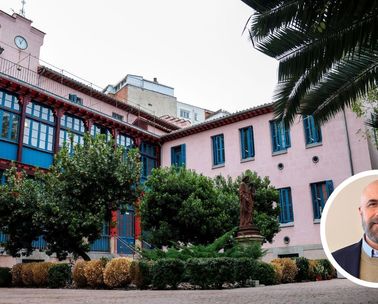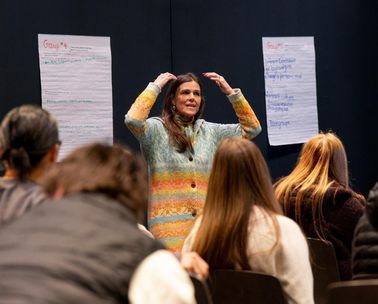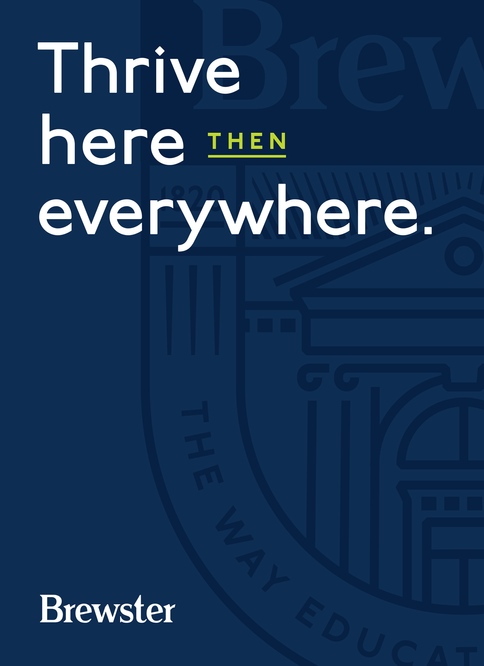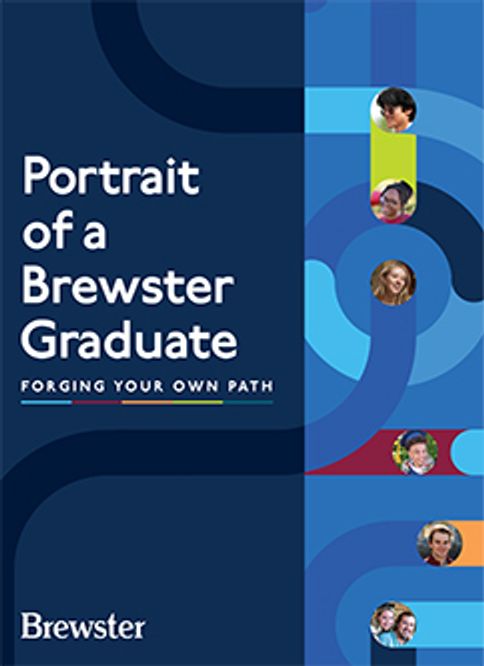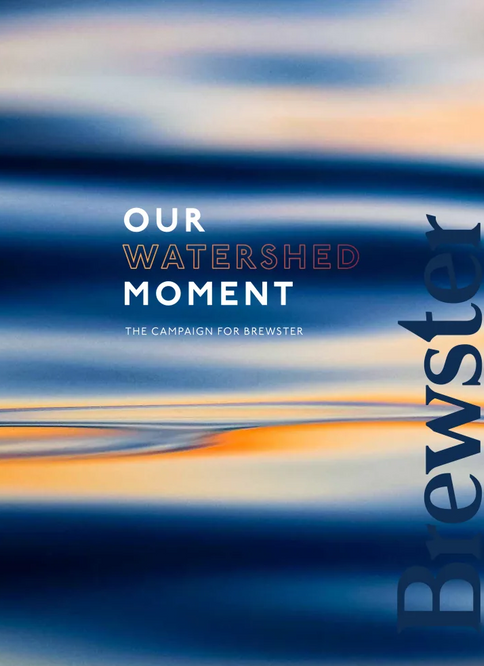

Engage in the Study of Past and Present
Courses in the History and Social Science Department provide students with opportunities to engage in the study of the past and the present in order to develop the skills necessary to think critically and independently. Class discussions and other small group work provide opportunities to practice civil dialogue, deep listening, and perspective taking. Research and writing skills are integrated into all of our course offerings, and through careful scaffolding and frequent feedback, students become competent researchers, critical thinkers, and effective writers and speakers.

U.S. History
Students in Mr. Palmer's U.S. History class have the opportunity to put on their professional clothes for formal debates. Students select an issue and dive into research as they learn the ins and outs of both their topic and debate strategy.
History and Social Science Courses
Ancient and Classical Worlds
The 9th grade history course exposes students to the complexity and beauty of ancient and classical worlds. Students read and discuss excerpts from Hindu and Buddhist texts and study works of art and architecture to meaningfully construct their understanding of the past. They then embark on an exploration of the Roman Republic and Greek and Roman Empires, the study of which is linked to an investigation and comparison of two Abrahamic religions: Judaism and Christianity. The year concludes with a study of Islam and its expansion into North Africa and parts of Europe. The 9th grade Interim Studies Experience to Cadiz, Spain at the end of winter trimester, provides students with opportunities to connect their knowledge about the ancient world, societies and religions to exploration and study of Spanish cities, culture, history and language. Throughout the year, students learn how to read closely, select evidence from primary sources, and use it to support their claims in writing and in speaking.
Topics in Global History
The Topics in Global History course provides students with the skills & tools necessary to study in-depth historical subjects & developments across a global scale of time & space. Students will navigate the causes, consequences, & connections of historical events that have shaped societies across Asia, Africa, the Americas, and Europe, from the Crusades to the postmodern era. They will be encouraged to draw connections between past and present global challenges, & explore how people & institutions respond. Additionally, students will reflect on their civic responsibilities, considering how they can positively impact their local communities while thinking & acting as informed & considerate global citizens. As part of an authentic learning experience, students will actively engage in debates, collaborative projects, and mock trials, strengthening their public speaking, critical thinking, and collaborative research & inquiry. Students will learn essential skills for historical study, such as the use of primary and secondary sources, determining & assessing historical points of view, and developing & substantiating original, historically defensible arguments, all while cultivating their own capacity for critical & independent thinking.
United States History
The United States History course empowers students to become critical and independent thinkers, as well as engaged and well-informed participants in civic life, by studying, analyzing, and evaluating the history of the United States, its institutions and its peoples. This includes the structure, function, and powers of various levels of government, the ways in which Americans have actively participated in civic life throughout history, and how students themselves can be active and empowered citizens. Through a series of authentic and practical assessments, students will become more active and informed civic participants and historians. This course spans American Origins, from independence to the Civil War to the social and political dilemmas of the 20th and 21st centuries. This program of study offers students a historical and contemporary examination of the freedoms provided and extended to all Americans over time into the present day, and how they are interpreted and applied. Students will cultivate and practice the essential qualities and competencies required to live a life of purpose in the 21st century, such as media literacy, independent research, independent analysis and evaluation, use of sources, problem-solving, and collaboration.
Advanced Placement Modern World History
The Advanced Placement World History course instills in students the skills and habits necessary to engage in advanced-level history coursework. Students analyze and evaluate advanced historical topics, themes, and interpretations of Modern World History in the form of argumentation in writing and debate, dialogue, and personal reflection. Students cultivate their understanding of world history from c. 1200 CE to the present by learning to make connections and to craft historical arguments through the use of appropriate evidence, including primary & secondary sources, as they explore the evolution of world systems & peoples over time. Thematic learning objectives include Social Interactions (SIO), Political Systems and Governments (GOV), Interactions between Humans and the Environment (ENV), Cultural Developments (CDI), Economic Systems (ECN), and Technology and Innovation (TEC). In May, students take the AP World History: Modern exam.
Advanced Placement U.S. History
The Advanced Placement U.S. History course is designed to provide students with the skills necessary to analyze and evaluate advanced historical topics, themes, and interpretations of U.S. History in the form of argumentation in writing and debate, dialogue, and personal reflection. The course is divided into nine units that span the pre-Columbian era to the present day. Thematic learning objectives include American and National Identity (NAT), Politics and Power (POL), Work, Exchange, and Technology (WXT), Culture and Society (CUL), Migration and Settlement (MIG), Geography and the Environment (GEO), and America and the World (WOR). The course incorporates the learning objectives of a college 100-level survey course with the skills development of a 200-level seminar in order to offer an authentic college-level course and college-preparatory experience to qualified students. In May, students take the AP exam in U.S. History.
Advanced Placement Macroeconomics
AP Macroeconomics grapples with classical economic models and concepts. Students will examine economic performance measures, economic growth, and the global economy in addition to practicing how to integrate high-end analytical thinking skills with advanced writing and research skills. There is a strong emphasis on economic modeling, to demonstrate understanding and mastery of Supply, Demand, Fiscal and Monetary policies. Students begin modeling basic supply and demand scenarios and then move into more complex economic modeling of national economies, inflation, unemployment, recessions and economic expansion. The course incorporates the learning objectives of a college 100-level survey course in order to offer an authentic college-level course and college-preparatory experience to qualified students. Students enrolled in this course take the AP exam for Macroeconomics in May.
Advanced Placement Human Geography
AP Human Geography is a yearlong seminar that serves as an introduction to human geography or cultural geography. The content is presented thematically rather than regionally and is organized around the discipline’s main subfields: economic geography, cultural geography, political geography, and urban geography. The approach of the course is spatial and problem oriented. Case studies are drawn from all world regions, with an emphasis on understanding the world in which we live today. Historical information serves to enrich analysis of the impacts of phenomena such as globalization, colonialism, and human–environment relationships on places, regions, cultural landscapes, and patterns of interaction. Students will see geography as a discipline relevant to the world in which they live; as a source of ideas for identifying, clarifying, and solving problems at various scales; and as a key component of building global citizenship and environmental stewardship. Students enrolled in this course take the AP exam for Human Geography in May.
Advanced Placement Psychology
The AP Psychology course provides students with an introductory psychology framework for college-level content and skills, as recommended by the American Psychological Association (APA) Introductory Psychology Initiative. These skills include Social Science Practices such as Research Design, Data Interpretation, Concept Application, and Evidence-based Argumentation. The Framework is organized into five content-based units, including - Biological Bases for Behavior, Cognition and Development, Social Psychology, and Mental and Physical Health. This framework integrates key skills throughout the course that students need to be successful in subsequent courses in psychology.
Advanced Placement Research*
(only for students who have completed AP Seminar)
AP Research, the second course in the AP Capstone experience, allows students to deeply explore an academic topic, problem, issue, or idea of individual interest. Students design, plan, and implement a yearlong investigation to address a research question. Through this inquiry, they further the skills they acquired in the AP Seminar course by learning research methodology, employing ethical research practices, and accessing, analyzing, and synthesizing information. Students reflect on their skill development, document their processes, and curate the artifacts of their scholarly work through a process and reflection portfolio. The course culminates in an academic paper of 4,000–5,000 words (accompanied by a performance, exhibit, or product where applicable) and a presentation with an oral defense.
[From AP College Board]
*Can be taken for English or History/Social Science credit.
Current Issues in a Global Context
Current Issues in a Global Context allows students to become engaged thinkers while exploring the current issues & challenges pertinent in present-day America. The course is organized into three trimester-long topics of study: the Growth of US Foreign Policy in the Mideast from the writing of the U.S. Constitution to the 9/11 terrorist attacks, Criminal Justice System Reform, and Modern Media and Its Societal Impacts (spring trimester). Students will engage & evaluate these subjects through a series of formative and summative assessments that include hands-on-activities, debates of varying formats, performance-based assessments, as well as numerous educational competitions to reinforce the material in a fun and engaging way. This program of study offers students many opportunities to apply an understanding of Current Issues & their historical context which directly impact their future. We will dissect how these current issues shaped the American character and how this ever-morphing character has altered the global viewpoints of Americans, its policies, and the American identity. Students will cultivate the knowledge and skills crucial toward global scholarship in the 21st century. This dynamic, engaging course allows students to refine the vital skills needed to contribute to their
society locally and globally.
Psychology of the Human Brain
Psychology of the Human Brain seeks to provide students with a strong introduction to
college-level neuro-psychology. The course allows students to dissect and evaluate human behaviors and their impact on the world around them by exploring the behavior, function, and anatomy of the human brain. This includes how parts of the brain jointly control & influence the behaviors of humans. Students will cover this journey through three trimester-long sections: Introduction to Psychology and the Human Brain (fall), Social Psychology and the Human Brain (winter), and Positive Psychology & the Inner Cosmos (spring). This program offers a wide range of assessments, including hands-on activities, competitive games, essay writing, gallery presentations, technological expressions, debates, personality research, and the use of a variety of education-based gaming platforms. This program of study allows students to apply course knowledge toward a greater understanding of themselves and the world around them.
Economics
This year-long course blends aspects of practical application of economics with theoretical approaches. The fall trimester (Economics in Everyday Life) focuses on understanding how economics shapes daily life. After a brief overview of global economic concepts, students engage in project-based learning tied to life after high school. Topics include budgeting, car purchasing (buying, financing, or leasing), credit management, financial instruments, retirement accounts, and the stock market. The winter trimester (Business Organization & Entrepreneurship) explores economic issues related to business, including finance and organization. Students examine inflation and its effects on local and global economies. Through entrepreneurial projects, they create investment pitches, identify funding sources, assess hiring needs, and develop products. Additionally, students build resumes, write cover letters, and practice interview skills. In the spring trimester (Classical Economic Theory and Globalization), students study global economic interconnections through trade and investment. Topics include international trade models, government policies, currency exchange rates, and their effects on trade. The course also covers development economics, inequality, and public sector issues like health care and environmental economics. Activities include discussions, simulations, debates, and research.



